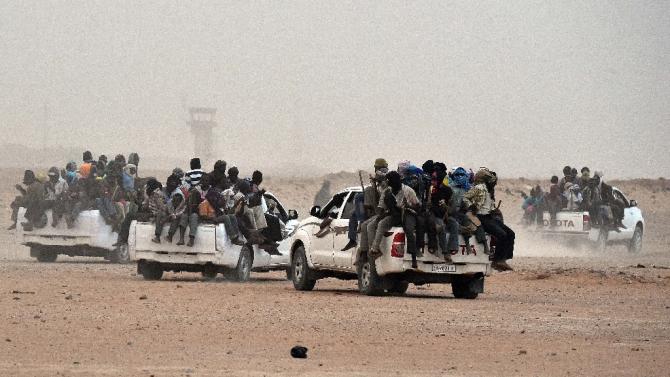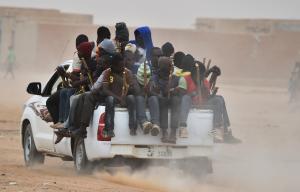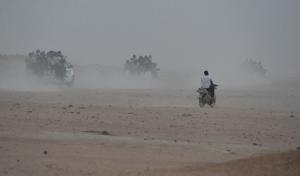Date: Tue, 16 Jun 2015 00:31:39 +0200
Agadez (Niger) (AFP) - Hosseini -- not his real name -- handles the steering-wheel deftly. A onetime tourist chauffeur, he makes his living smuggling African migrants from his hometown of Agadez, in northern Niger, to the Libyan border.
"See the bands of white sticky-tape stuck to the back of the pick-up?" he says. "That's because it's used for migrants and it stops them scratching the paint when they sit at the back with their legs hanging out."
A blue turban wrapped around his head, Hosseini, a member of Niger's ethnic Tuareg people, talks about his job calmly and with little apparent emotion.
A driver can earn 250,000 CFA francs ($430, 380 euros) for bringing a truckload of migrants to the Libyan border. If they're willing to shoulder the extra risks of entering Libya, where bandits work the roads, that rises to 400,000 CFA francs.
In Niger, a country where two thirds of the population lives on less than a euro a day, the appeal was obvious to Hosseini.
"I prefer being a driver to working in tourism," he says, adding that his old job was less lucrative. He has completed two trips to the Libyan border so far, and plans many more once he's bought his own pick-up.
In Agadez, the smugglers' vehicles known as "Taliban 4X4s" are legion. Few of them carry license-plates, though some have Libyan ones, and the sight of them speeding through the dusty streets of the ancient town are a constant reminder of the busy human trafficking trade.
"You leave in a convoy on a Monday night. You arrive on Wednesday morning at the Libyan border, 900 kilometres (560 miles) away. When night falls you park in the dunes to avoid the bandits," said Hosseini, who is in his 30s.
The return journey starts on a Thursday with the cars back in Agadez every Friday night.
"You have to drive as fast as possible. You're doing a steady 140 kilometres per hour, sometimes hitting 160 kilometres an hour, with 300 litres of petrol on board that you use on the way. At that speed, if a tyre blows out, you're finished."
Pick-ups screech around the town's outskirts as if competing in a mechanical rodeo, dust flying, engines roaring.
And there's a reminder that the traffic is two-way: on Friday nights taxis and tuk-tuks gather to pick up destitute migrants returning from Libya, who have found that the dangerous and expensive journey was not, after all, the answer to their problems.
- Corpses -
An amateur video of an accident near the border two months ago shows three 4X4s. The first is bogged down in sand, the second hits it, the third is parked some way away.
Libyan soldiers are present at the accident site. One of them grabs the foot of a migrant sliced off neatly during the collision. A crowd of around 50 others stand about watching. Coloured heaps are strewn in the white sand in the background. "Corpses," says Hosseini.
A parent, he doesn't see himself as a criminal, or a member of the mafia.
"The key thing for me is to bring my customers to the port," he says. "There are people who leave and manage to get to Europe without any problems, and there are those who die. That's life."
A pick-up bound for Libya will be packed with 25 migrants hoping to start a new life in Libya or beyond. Eight will be squashed into the cab: two in the front, six jammed in the back. "We take the seats out to make more room," explains Hosseini.
The other 17 migrants are piled into the back of the pick-up, hemmed in with sticks of wood to stop them falling out.
"If one of them falls, the others tap on the roof and I stop the van," says Hosseini.
His passengers, then, might be considered amongst the luckier ones. There are many tales of migrants abandoned in the desert, left to face a slow and certain death.
Agadez expects the arrival of 150,000 migrants in 2015. Many of them will be from West Africa -- Senegal, Gambia or Mali. Some will be hoping to find work in Libya; others intend to set sail from there to Europe, despite the risks. The perilous sea journey has cost some 1,800 migrants their lives this year.



